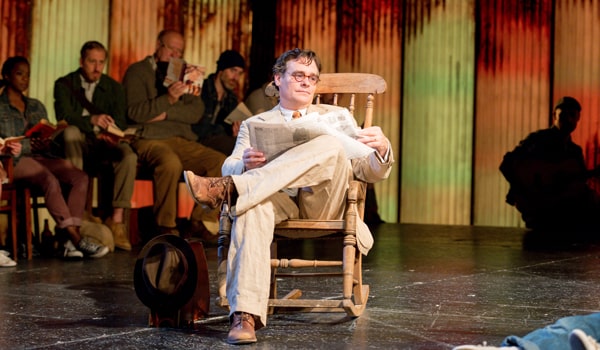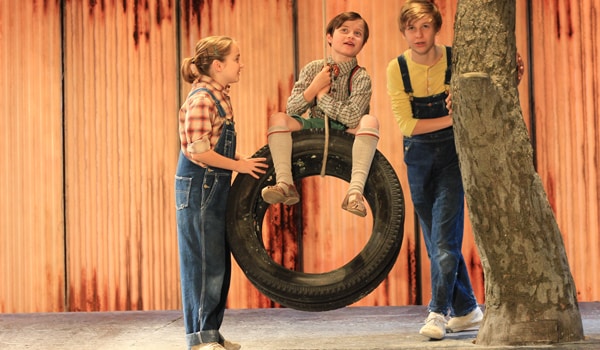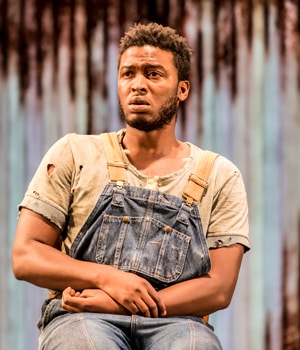
To Kill A Mockingbird
Barbican Theatre
June 30 2015
5 Stars
The lanky boy, tousled hair, eager eyes, air gun in hand, surveys the landscape. His nimble, gloriously tom-boyish sister, energy and enthusiasm bustling out of every pore, also plays with her air gun. Their father has refused to teach them the ways of guns, but they want to play anyway. The boy resents his father, a little, maybe more, because he doesn’t do what the other boys’ father’s do. It rankles him.
In the distance, there is movement and the boy stiffens. He looks again. Alarm spreads through his features, down his spine. He tells his sister what he has seen. His calm, sure voice, reminiscent to her of their father’s mellifluous sound, conveys urgency. She looks where he looks. A mad dog is limping towards them. It has not seen or smelt them but the boy knows that if the dog notices them, it will be bad. Holding his ground, he sends his sibling off to get the adults. She resists, unwilling to leave him alone, but then goes.
The lad is scared, but stubborn. He watches intently. Slowly, adults arrive. Then, his father and the sheriff, the man with the town star, carrying a rifle, are there. The two men look – definitely a rabid dog. Father orders son aside, asks the lawman to shoot the dog, end the peril. But the lawman wants the lad’s Father, the one who would not teach his children about guns, to take the shot – because there will only be one chance. Father doesn’t want to do it, but relents under pressure.
He feels the enormity of the responsibility on his shoulders. Everyone is watching him, depending on him, but especially his children. He hesitates, fumbles, drops his glasses, sweat pouring down his brow. The lad looks crestfallen, visibly diminished. Shamed.

The Father takes the shot, quickly, firmly. The target drops immediately. The Father has immaculate aim. The lad looks on in wonder, changed forever, proud now of his Father, and more understanding of the importance of being a gentleman.
This is Timothy Sheader’s utterly astonishing, profoundly beautiful, and intensely gripping production of To Kill A Mockingbird, now playing at the Barbican Theatre. It’s not practically perfect in every way – it is absolutely perfect in every way. In terms of glorious story-telling and superb ensemble acting rapturously telling a richly detailed and extraordinarily resonant – but sublimely simple – tale, there is nothing to touch this production (bar Gypsy) currently playing in London.
Harper Lee’s glorious book, first published 55 years ago, has been adapted for the stage with grace and style by Christopher Sergel. Characters are clearly and deftly established; the dialogue, much of it Lee’s own words, is sharp and lacking entirely the hint of false notes. Every aspect of the adaptation works. It might not cover the whole book, every memorable incident, each memorable character, but it tells Sergel’s version of that story with consummate flair.
The cornerstone of the adaptation sees all but the main four actors read extracts from Lee’s novel, represented in the form of various editions from across the decades. These extracts set the scenes, propel the action, comment on developments. But they do more than that – each actor uses their real voice when reciting text, and this creates and establishes a commonality with the audience, tapping into the audience’s own experiences of reading. Equally, the approach underlines the universality of the core of Lee’s novel – humanity, dignity, tolerance and understanding. And it reminds one of one’s own childhood, of being read to oneself.
This acute sense of childhood is central to the vision of the production. This is reflected in Sheader’s and Designer Jon Bausor’s breathtaking design: corrugated iron sheeting surrounds three sides of the stage, a garden bed between the rusty perennials of country life and the stage area; a blackboard-esque floor allows chalk to be used to sketch out the shapes and feel of the main spaces of the town where the Finch family live; a huge life-like tree, the ultimate symbol of childhood freedom, dominates the stage, it’s limbs strong, the green leaves everywhere affirming life. Along the sides of the stage are chairs, tables, a bed, the other props that, in a simple, child-like way, depict the places where the key events play out.
It is difficult to imagine a better set design or way of playing this remarkable adaptation.
Sheader ensures the pace never lags, but does not speed through any passage: the sense of the long, hot summers of a Southern American childhood is palpable. Nor does he stoop to cheap sentiment – the tale, it’s highs and lows, is told cleanly, astutely, calmly and warmly. The great images are all there: Atticus outside the Courthouse standing watch over the accused black man, a single lightbulb by his side; his children defusing the anger and intent of the lynch mob; Scout swinging on the tyre; Jem, Scout and Dill all eager to get Boo out of his house; the shooting of the mad dog; poor Tom Robinson shattered, in Court, giving evidence; Atticus hugging Scout hard; Jem with the broken arm, Atticus keeping vigil.
The emotional heart of the story, the vivid, true characters, are laid bare: they are real, tangible, and the world they occupy seems real too. You can just about smell Calpurnia’s cooking or one of Miss Maudie’s cakes emanating wholesome pleasure. It’s an overwhelmingly beguiling experience to undergo this remarkable journey with this remarkable cast.
In a cast where every single person is exceptional, there are some phenomenal stand-out performances. Zackary Momoh is riveting, heart-breaking, as the falsely accused Tom Robinson, his exquisite work in the key Courtroom scene communicating a lifetime spent in misery and contempt, but a man with a gentle, pure and forgiving nature. Christopher Akrill makes Boo Radley entirely plausible, utterly real, and the scene where he gently strokes the head of the stricken Jem is impeccably judged. As Bob Ewell, Ryan Pope is an apocalyptic cocktail of wiry, racist, drunken abuse, almost unbearably realistic.

Connie Walker is splendidly vile, in completely different ways, in the dual roles of Mrs Dubose and the ghastly Stephanie Crawford; Natalie Grady is all delightful homespun geniality as the kindly neighbour, Miss Maudie, and Susan Lawson-Reynolds finds exactly the perfect combination of wrath and maternal love as Calpurnia, the woman who holds the Finch family together.
The three children were utterly remarkable: Rosie Boore, immaculate as the strong-willed, curious and brave Scout; Billy Price, a tangle of adolescent emotion and emerging manhood, is a terrific, spot-on Jem; and Milo Panni makes Dill engaging and damn good fun. They are a terrific trio, full of energy and skill.
Quite rightly, though, the beating heart and all-pervading conscience of the play lies in the assured and measured hands of Robert Sean Leonard, who brings an intensity and gravitas to the role of Atticus which is unbeatable. A gently stern father, a fearless defender of the law and truth, a remarkable advocate and a humble, honest man, Leonard’s Finch is perfection, complete with slightly crumpled lined three piece suit. It’s a magical performance that makes every other cast member’s job that much easier.
Naomi Said and Polly Bennett provide excellent movement, Phil King’s original music is hauntingly evocative and he gives it splendid delivery. Oliver Fenwick lights everything to his usual exacting standards: gorgeous. The full moon is especially wondrous. Ian Dickinson’s sound design is immaculate.
There is nothing not to like here and all but the hardest of hearts will be moved to tears at one or more points throughout the evening. This is the best drama playing in London. It should be compulsory viewing for every child of school age. It should transfer to the West End and then Broadway and play for seasons.
It is pitch-perfect in every way.
To Kill A Mockingbird runs until 25 July 2015 at the Barbican Theatre
